The New Psychological Contract and Employee-Employer Expectations
VerifiedAdded on 2023/01/18
|12
|2897
|82
Essay
AI Summary
This essay delves into the concept of the new psychological contract, examining the evolving expectations between employees and employers. It defines the psychological contract as an unwritten agreement influencing workplace behavior and addresses the challenges arising from shifting expectations. The essay explores employer expectations, such as positive attitudes, initiative, continuous learning, and trustworthiness, while also analyzing the sources of change, including evolving demands, the role of human resources, organizational dynamics, and the value placed on knowledge and ability. It provides a historical overview of the psychological contract, tracing its evolution and impact on employee behavior. The essay also offers solutions for managing situations where expectations are unmet, such as improved communication and tailored rewards. Finally, it discusses the implications of changes in the psychological contract on employment regulations and workplace dynamics.
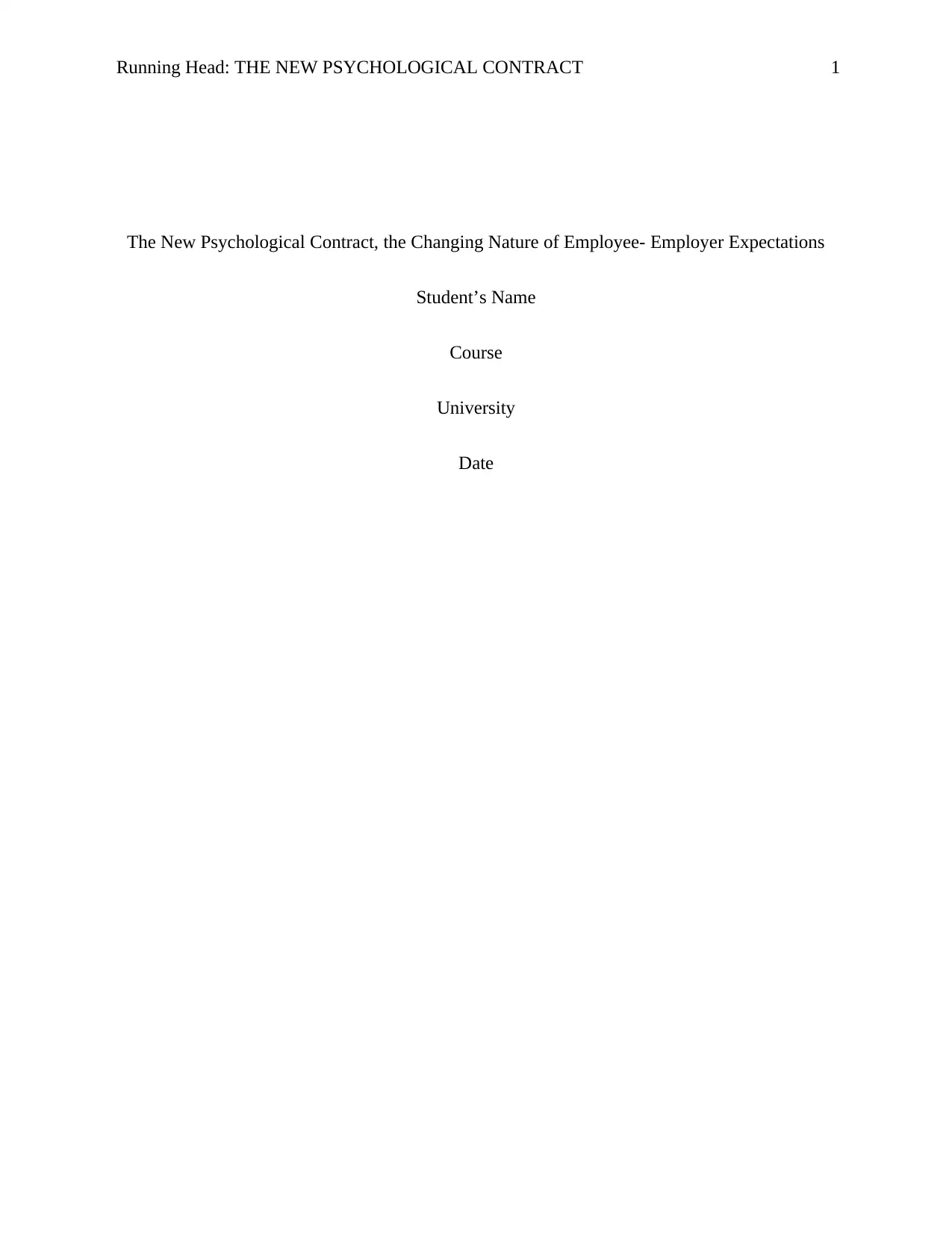
Running Head: THE NEW PSYCHOLOGICAL CONTRACT 1
The New Psychological Contract, the Changing Nature of Employee- Employer Expectations
Student’s Name
Course
University
Date
The New Psychological Contract, the Changing Nature of Employee- Employer Expectations
Student’s Name
Course
University
Date
Paraphrase This Document
Need a fresh take? Get an instant paraphrase of this document with our AI Paraphraser
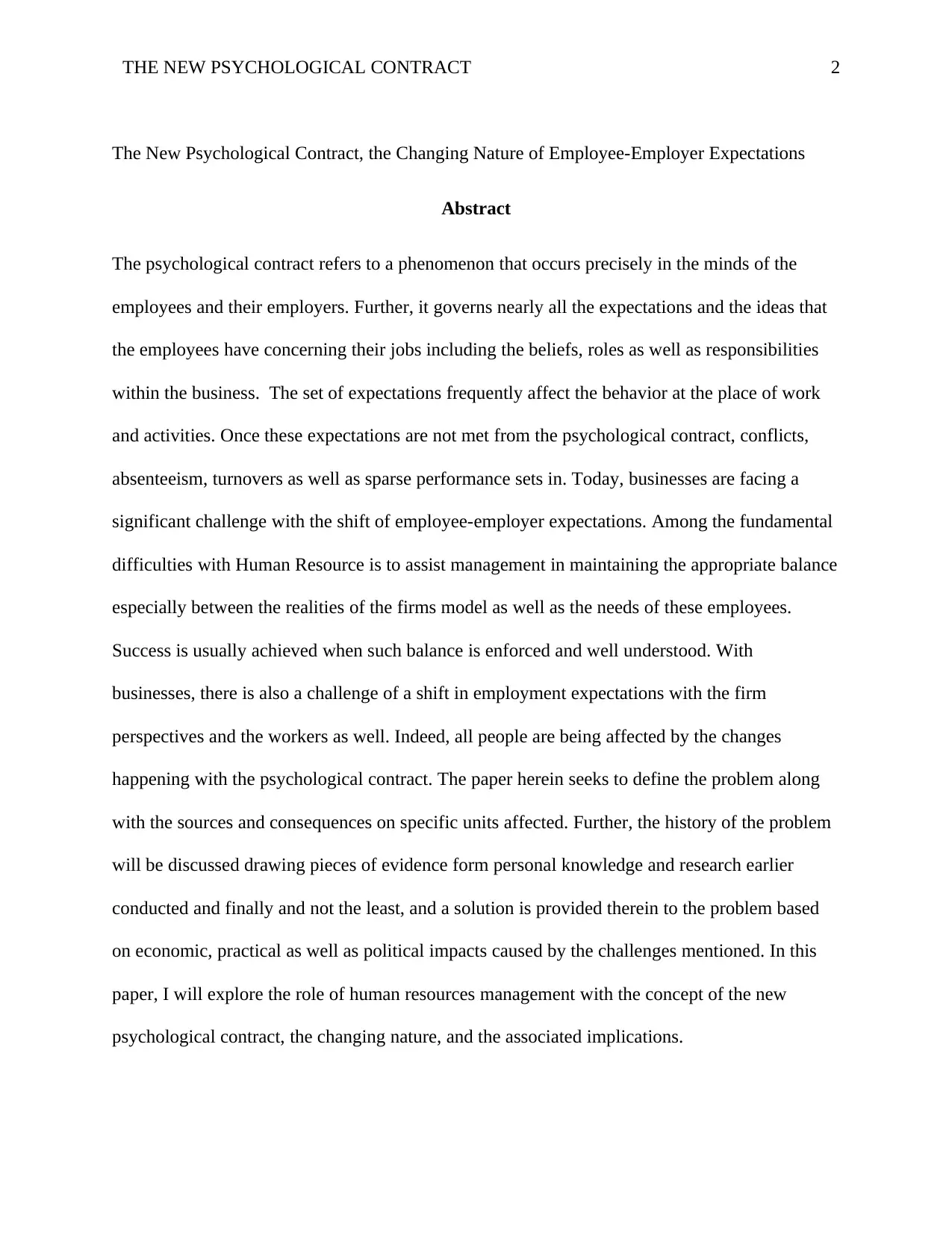
THE NEW PSYCHOLOGICAL CONTRACT 2
The New Psychological Contract, the Changing Nature of Employee-Employer Expectations
Abstract
The psychological contract refers to a phenomenon that occurs precisely in the minds of the
employees and their employers. Further, it governs nearly all the expectations and the ideas that
the employees have concerning their jobs including the beliefs, roles as well as responsibilities
within the business. The set of expectations frequently affect the behavior at the place of work
and activities. Once these expectations are not met from the psychological contract, conflicts,
absenteeism, turnovers as well as sparse performance sets in. Today, businesses are facing a
significant challenge with the shift of employee-employer expectations. Among the fundamental
difficulties with Human Resource is to assist management in maintaining the appropriate balance
especially between the realities of the firms model as well as the needs of these employees.
Success is usually achieved when such balance is enforced and well understood. With
businesses, there is also a challenge of a shift in employment expectations with the firm
perspectives and the workers as well. Indeed, all people are being affected by the changes
happening with the psychological contract. The paper herein seeks to define the problem along
with the sources and consequences on specific units affected. Further, the history of the problem
will be discussed drawing pieces of evidence form personal knowledge and research earlier
conducted and finally and not the least, and a solution is provided therein to the problem based
on economic, practical as well as political impacts caused by the challenges mentioned. In this
paper, I will explore the role of human resources management with the concept of the new
psychological contract, the changing nature, and the associated implications.
The New Psychological Contract, the Changing Nature of Employee-Employer Expectations
Abstract
The psychological contract refers to a phenomenon that occurs precisely in the minds of the
employees and their employers. Further, it governs nearly all the expectations and the ideas that
the employees have concerning their jobs including the beliefs, roles as well as responsibilities
within the business. The set of expectations frequently affect the behavior at the place of work
and activities. Once these expectations are not met from the psychological contract, conflicts,
absenteeism, turnovers as well as sparse performance sets in. Today, businesses are facing a
significant challenge with the shift of employee-employer expectations. Among the fundamental
difficulties with Human Resource is to assist management in maintaining the appropriate balance
especially between the realities of the firms model as well as the needs of these employees.
Success is usually achieved when such balance is enforced and well understood. With
businesses, there is also a challenge of a shift in employment expectations with the firm
perspectives and the workers as well. Indeed, all people are being affected by the changes
happening with the psychological contract. The paper herein seeks to define the problem along
with the sources and consequences on specific units affected. Further, the history of the problem
will be discussed drawing pieces of evidence form personal knowledge and research earlier
conducted and finally and not the least, and a solution is provided therein to the problem based
on economic, practical as well as political impacts caused by the challenges mentioned. In this
paper, I will explore the role of human resources management with the concept of the new
psychological contract, the changing nature, and the associated implications.
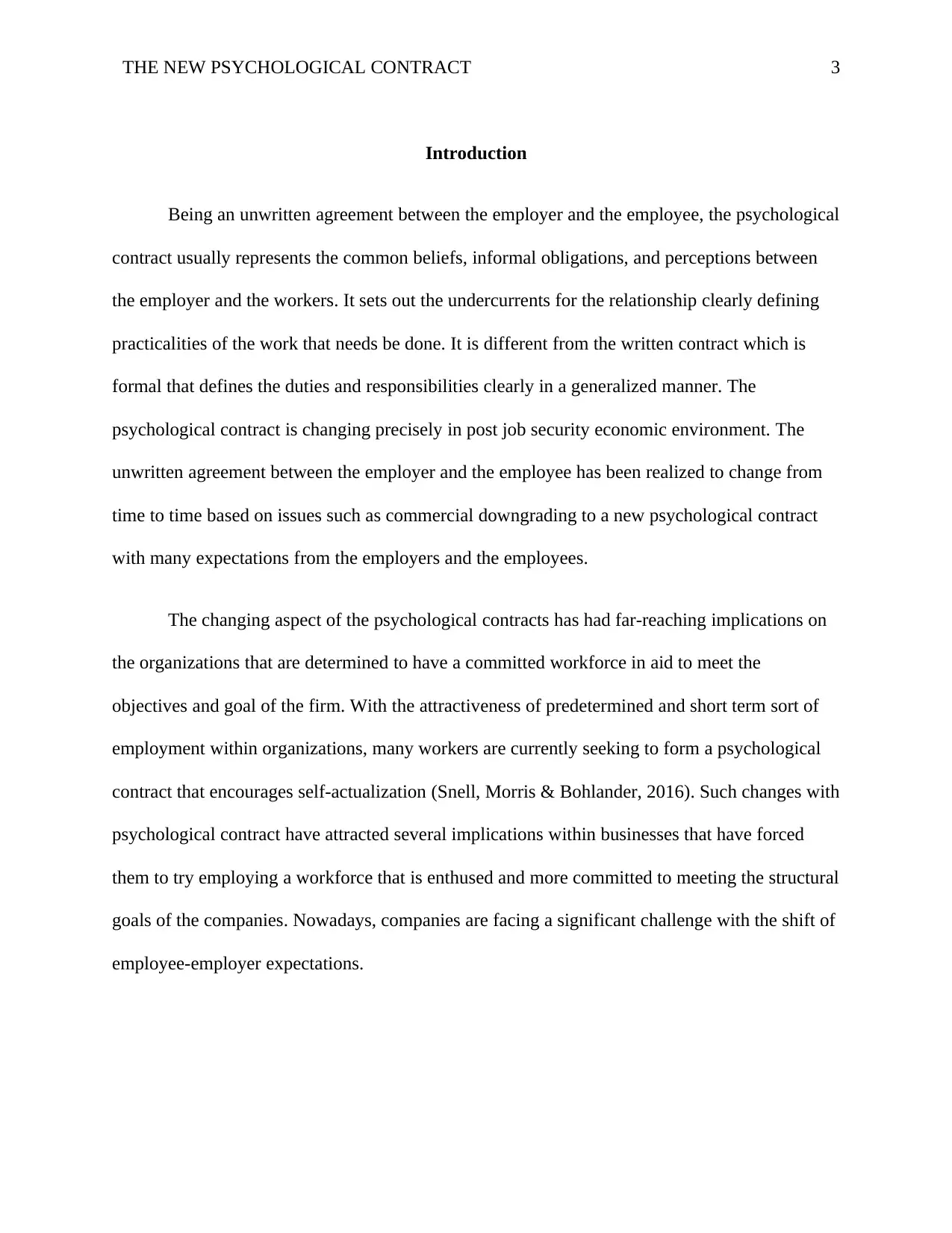
THE NEW PSYCHOLOGICAL CONTRACT 3
Introduction
Being an unwritten agreement between the employer and the employee, the psychological
contract usually represents the common beliefs, informal obligations, and perceptions between
the employer and the workers. It sets out the undercurrents for the relationship clearly defining
practicalities of the work that needs be done. It is different from the written contract which is
formal that defines the duties and responsibilities clearly in a generalized manner. The
psychological contract is changing precisely in post job security economic environment. The
unwritten agreement between the employer and the employee has been realized to change from
time to time based on issues such as commercial downgrading to a new psychological contract
with many expectations from the employers and the employees.
The changing aspect of the psychological contracts has had far-reaching implications on
the organizations that are determined to have a committed workforce in aid to meet the
objectives and goal of the firm. With the attractiveness of predetermined and short term sort of
employment within organizations, many workers are currently seeking to form a psychological
contract that encourages self-actualization (Snell, Morris & Bohlander, 2016). Such changes with
psychological contract have attracted several implications within businesses that have forced
them to try employing a workforce that is enthused and more committed to meeting the structural
goals of the companies. Nowadays, companies are facing a significant challenge with the shift of
employee-employer expectations.
Introduction
Being an unwritten agreement between the employer and the employee, the psychological
contract usually represents the common beliefs, informal obligations, and perceptions between
the employer and the workers. It sets out the undercurrents for the relationship clearly defining
practicalities of the work that needs be done. It is different from the written contract which is
formal that defines the duties and responsibilities clearly in a generalized manner. The
psychological contract is changing precisely in post job security economic environment. The
unwritten agreement between the employer and the employee has been realized to change from
time to time based on issues such as commercial downgrading to a new psychological contract
with many expectations from the employers and the employees.
The changing aspect of the psychological contracts has had far-reaching implications on
the organizations that are determined to have a committed workforce in aid to meet the
objectives and goal of the firm. With the attractiveness of predetermined and short term sort of
employment within organizations, many workers are currently seeking to form a psychological
contract that encourages self-actualization (Snell, Morris & Bohlander, 2016). Such changes with
psychological contract have attracted several implications within businesses that have forced
them to try employing a workforce that is enthused and more committed to meeting the structural
goals of the companies. Nowadays, companies are facing a significant challenge with the shift of
employee-employer expectations.
⊘ This is a preview!⊘
Do you want full access?
Subscribe today to unlock all pages.

Trusted by 1+ million students worldwide
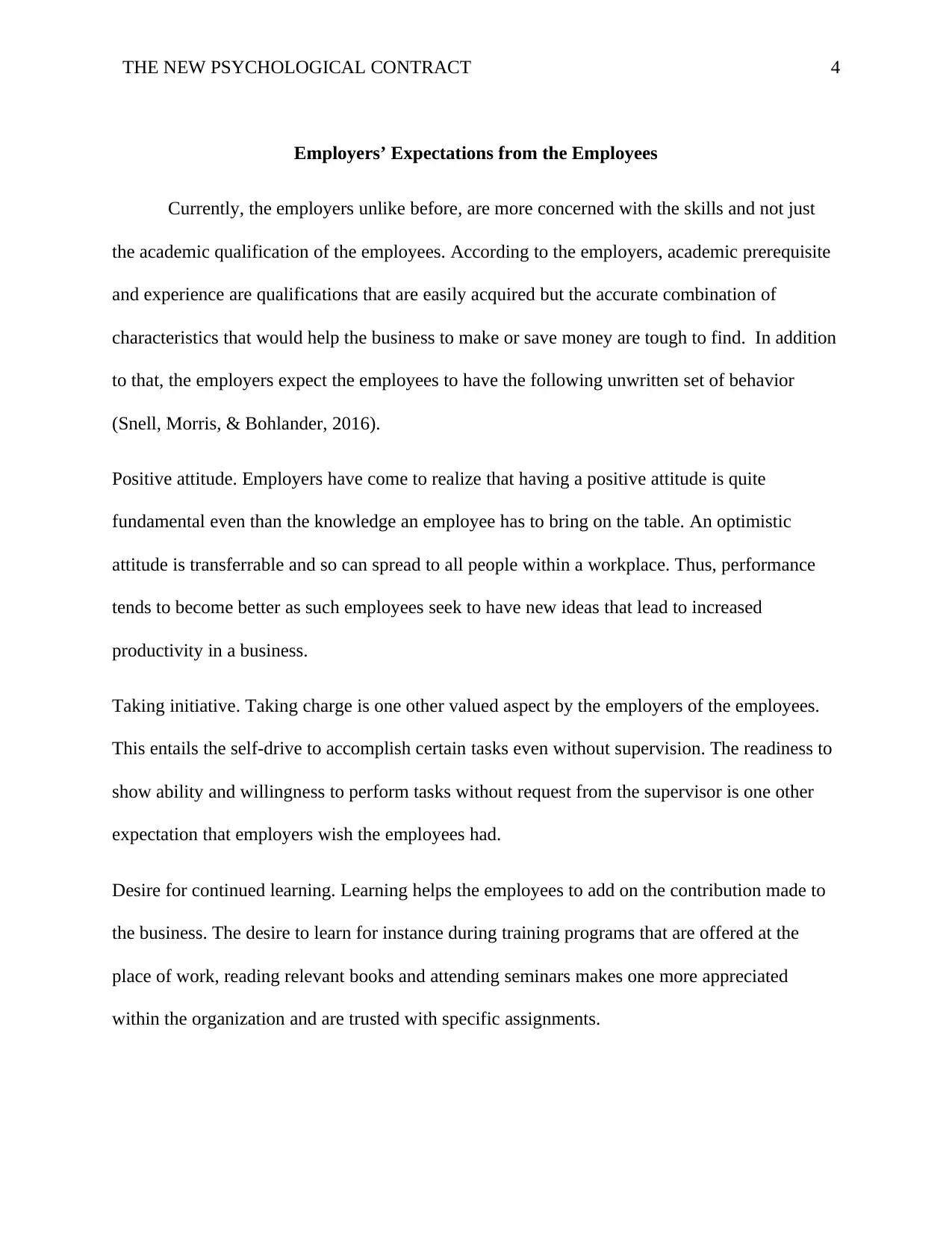
THE NEW PSYCHOLOGICAL CONTRACT 4
Employers’ Expectations from the Employees
Currently, the employers unlike before, are more concerned with the skills and not just
the academic qualification of the employees. According to the employers, academic prerequisite
and experience are qualifications that are easily acquired but the accurate combination of
characteristics that would help the business to make or save money are tough to find. In addition
to that, the employers expect the employees to have the following unwritten set of behavior
(Snell, Morris, & Bohlander, 2016).
Positive attitude. Employers have come to realize that having a positive attitude is quite
fundamental even than the knowledge an employee has to bring on the table. An optimistic
attitude is transferrable and so can spread to all people within a workplace. Thus, performance
tends to become better as such employees seek to have new ideas that lead to increased
productivity in a business.
Taking initiative. Taking charge is one other valued aspect by the employers of the employees.
This entails the self-drive to accomplish certain tasks even without supervision. The readiness to
show ability and willingness to perform tasks without request from the supervisor is one other
expectation that employers wish the employees had.
Desire for continued learning. Learning helps the employees to add on the contribution made to
the business. The desire to learn for instance during training programs that are offered at the
place of work, reading relevant books and attending seminars makes one more appreciated
within the organization and are trusted with specific assignments.
Employers’ Expectations from the Employees
Currently, the employers unlike before, are more concerned with the skills and not just
the academic qualification of the employees. According to the employers, academic prerequisite
and experience are qualifications that are easily acquired but the accurate combination of
characteristics that would help the business to make or save money are tough to find. In addition
to that, the employers expect the employees to have the following unwritten set of behavior
(Snell, Morris, & Bohlander, 2016).
Positive attitude. Employers have come to realize that having a positive attitude is quite
fundamental even than the knowledge an employee has to bring on the table. An optimistic
attitude is transferrable and so can spread to all people within a workplace. Thus, performance
tends to become better as such employees seek to have new ideas that lead to increased
productivity in a business.
Taking initiative. Taking charge is one other valued aspect by the employers of the employees.
This entails the self-drive to accomplish certain tasks even without supervision. The readiness to
show ability and willingness to perform tasks without request from the supervisor is one other
expectation that employers wish the employees had.
Desire for continued learning. Learning helps the employees to add on the contribution made to
the business. The desire to learn for instance during training programs that are offered at the
place of work, reading relevant books and attending seminars makes one more appreciated
within the organization and are trusted with specific assignments.
Paraphrase This Document
Need a fresh take? Get an instant paraphrase of this document with our AI Paraphraser
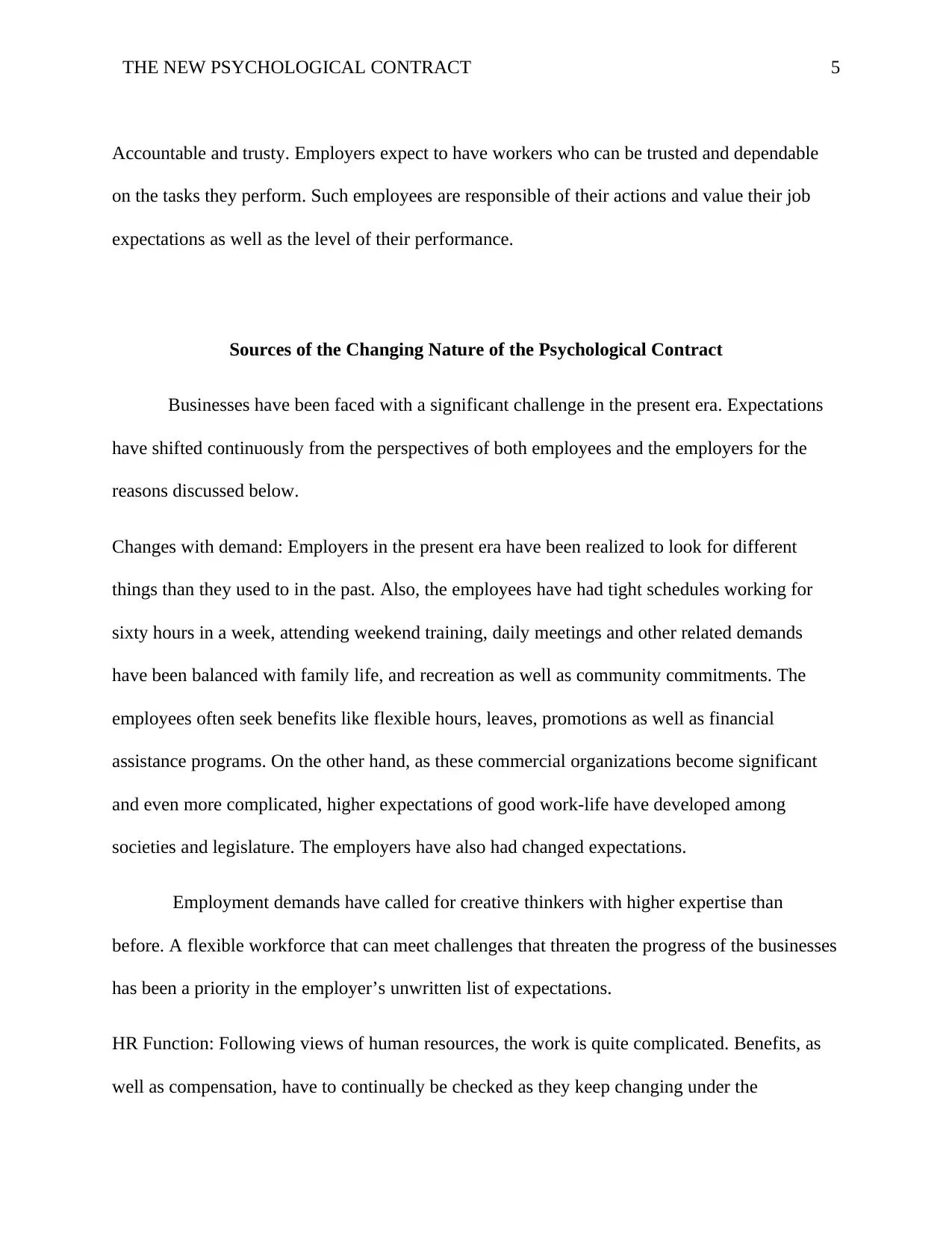
THE NEW PSYCHOLOGICAL CONTRACT 5
Accountable and trusty. Employers expect to have workers who can be trusted and dependable
on the tasks they perform. Such employees are responsible of their actions and value their job
expectations as well as the level of their performance.
Sources of the Changing Nature of the Psychological Contract
Businesses have been faced with a significant challenge in the present era. Expectations
have shifted continuously from the perspectives of both employees and the employers for the
reasons discussed below.
Changes with demand: Employers in the present era have been realized to look for different
things than they used to in the past. Also, the employees have had tight schedules working for
sixty hours in a week, attending weekend training, daily meetings and other related demands
have been balanced with family life, and recreation as well as community commitments. The
employees often seek benefits like flexible hours, leaves, promotions as well as financial
assistance programs. On the other hand, as these commercial organizations become significant
and even more complicated, higher expectations of good work-life have developed among
societies and legislature. The employers have also had changed expectations.
Employment demands have called for creative thinkers with higher expertise than
before. A flexible workforce that can meet challenges that threaten the progress of the businesses
has been a priority in the employer’s unwritten list of expectations.
HR Function: Following views of human resources, the work is quite complicated. Benefits, as
well as compensation, have to continually be checked as they keep changing under the
Accountable and trusty. Employers expect to have workers who can be trusted and dependable
on the tasks they perform. Such employees are responsible of their actions and value their job
expectations as well as the level of their performance.
Sources of the Changing Nature of the Psychological Contract
Businesses have been faced with a significant challenge in the present era. Expectations
have shifted continuously from the perspectives of both employees and the employers for the
reasons discussed below.
Changes with demand: Employers in the present era have been realized to look for different
things than they used to in the past. Also, the employees have had tight schedules working for
sixty hours in a week, attending weekend training, daily meetings and other related demands
have been balanced with family life, and recreation as well as community commitments. The
employees often seek benefits like flexible hours, leaves, promotions as well as financial
assistance programs. On the other hand, as these commercial organizations become significant
and even more complicated, higher expectations of good work-life have developed among
societies and legislature. The employers have also had changed expectations.
Employment demands have called for creative thinkers with higher expertise than
before. A flexible workforce that can meet challenges that threaten the progress of the businesses
has been a priority in the employer’s unwritten list of expectations.
HR Function: Following views of human resources, the work is quite complicated. Benefits, as
well as compensation, have to continually be checked as they keep changing under the
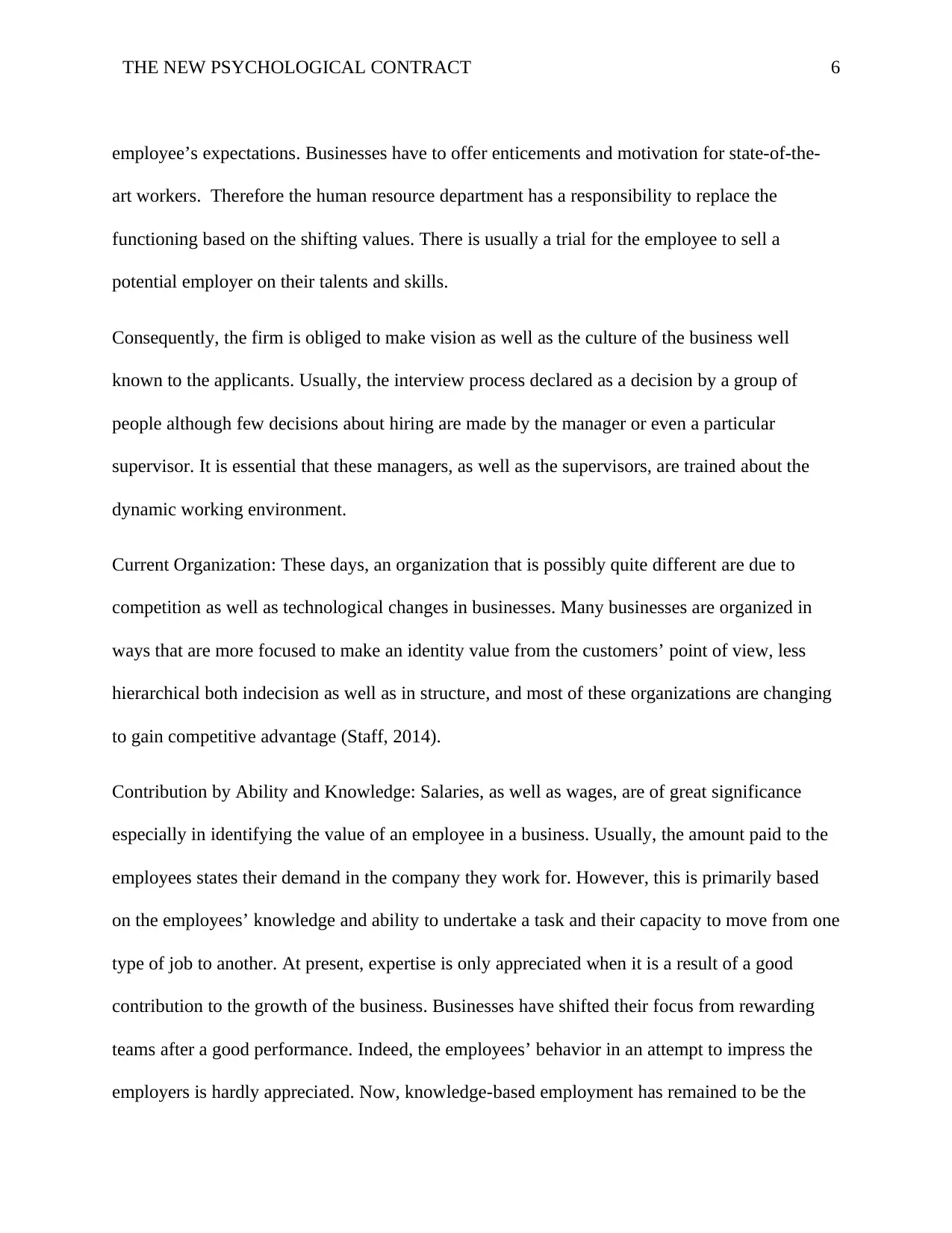
THE NEW PSYCHOLOGICAL CONTRACT 6
employee’s expectations. Businesses have to offer enticements and motivation for state-of-the-
art workers. Therefore the human resource department has a responsibility to replace the
functioning based on the shifting values. There is usually a trial for the employee to sell a
potential employer on their talents and skills.
Consequently, the firm is obliged to make vision as well as the culture of the business well
known to the applicants. Usually, the interview process declared as a decision by a group of
people although few decisions about hiring are made by the manager or even a particular
supervisor. It is essential that these managers, as well as the supervisors, are trained about the
dynamic working environment.
Current Organization: These days, an organization that is possibly quite different are due to
competition as well as technological changes in businesses. Many businesses are organized in
ways that are more focused to make an identity value from the customers’ point of view, less
hierarchical both indecision as well as in structure, and most of these organizations are changing
to gain competitive advantage (Staff, 2014).
Contribution by Ability and Knowledge: Salaries, as well as wages, are of great significance
especially in identifying the value of an employee in a business. Usually, the amount paid to the
employees states their demand in the company they work for. However, this is primarily based
on the employees’ knowledge and ability to undertake a task and their capacity to move from one
type of job to another. At present, expertise is only appreciated when it is a result of a good
contribution to the growth of the business. Businesses have shifted their focus from rewarding
teams after a good performance. Indeed, the employees’ behavior in an attempt to impress the
employers is hardly appreciated. Now, knowledge-based employment has remained to be the
employee’s expectations. Businesses have to offer enticements and motivation for state-of-the-
art workers. Therefore the human resource department has a responsibility to replace the
functioning based on the shifting values. There is usually a trial for the employee to sell a
potential employer on their talents and skills.
Consequently, the firm is obliged to make vision as well as the culture of the business well
known to the applicants. Usually, the interview process declared as a decision by a group of
people although few decisions about hiring are made by the manager or even a particular
supervisor. It is essential that these managers, as well as the supervisors, are trained about the
dynamic working environment.
Current Organization: These days, an organization that is possibly quite different are due to
competition as well as technological changes in businesses. Many businesses are organized in
ways that are more focused to make an identity value from the customers’ point of view, less
hierarchical both indecision as well as in structure, and most of these organizations are changing
to gain competitive advantage (Staff, 2014).
Contribution by Ability and Knowledge: Salaries, as well as wages, are of great significance
especially in identifying the value of an employee in a business. Usually, the amount paid to the
employees states their demand in the company they work for. However, this is primarily based
on the employees’ knowledge and ability to undertake a task and their capacity to move from one
type of job to another. At present, expertise is only appreciated when it is a result of a good
contribution to the growth of the business. Businesses have shifted their focus from rewarding
teams after a good performance. Indeed, the employees’ behavior in an attempt to impress the
employers is hardly appreciated. Now, knowledge-based employment has remained to be the
⊘ This is a preview!⊘
Do you want full access?
Subscribe today to unlock all pages.

Trusted by 1+ million students worldwide
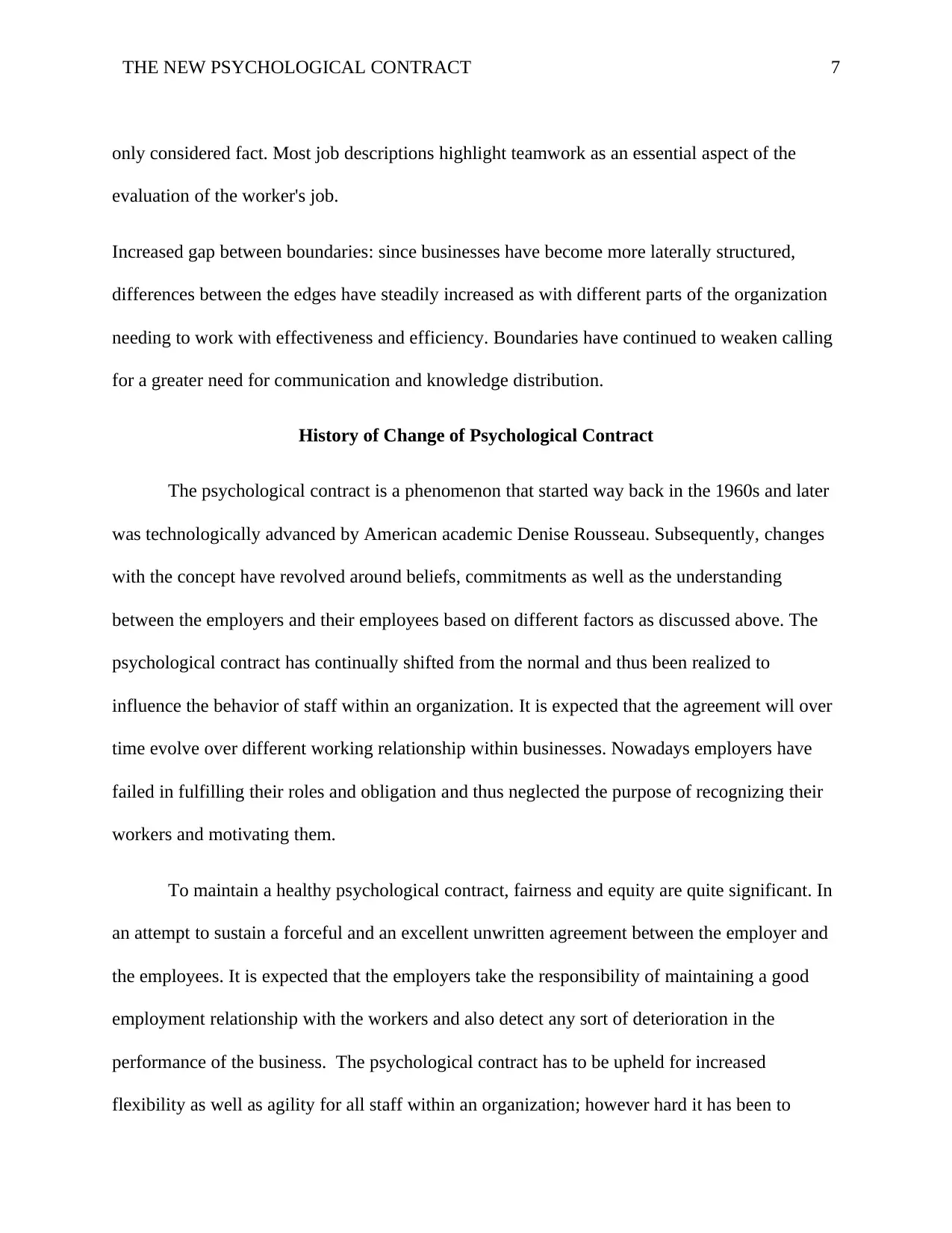
THE NEW PSYCHOLOGICAL CONTRACT 7
only considered fact. Most job descriptions highlight teamwork as an essential aspect of the
evaluation of the worker's job.
Increased gap between boundaries: since businesses have become more laterally structured,
differences between the edges have steadily increased as with different parts of the organization
needing to work with effectiveness and efficiency. Boundaries have continued to weaken calling
for a greater need for communication and knowledge distribution.
History of Change of Psychological Contract
The psychological contract is a phenomenon that started way back in the 1960s and later
was technologically advanced by American academic Denise Rousseau. Subsequently, changes
with the concept have revolved around beliefs, commitments as well as the understanding
between the employers and their employees based on different factors as discussed above. The
psychological contract has continually shifted from the normal and thus been realized to
influence the behavior of staff within an organization. It is expected that the agreement will over
time evolve over different working relationship within businesses. Nowadays employers have
failed in fulfilling their roles and obligation and thus neglected the purpose of recognizing their
workers and motivating them.
To maintain a healthy psychological contract, fairness and equity are quite significant. In
an attempt to sustain a forceful and an excellent unwritten agreement between the employer and
the employees. It is expected that the employers take the responsibility of maintaining a good
employment relationship with the workers and also detect any sort of deterioration in the
performance of the business. The psychological contract has to be upheld for increased
flexibility as well as agility for all staff within an organization; however hard it has been to
only considered fact. Most job descriptions highlight teamwork as an essential aspect of the
evaluation of the worker's job.
Increased gap between boundaries: since businesses have become more laterally structured,
differences between the edges have steadily increased as with different parts of the organization
needing to work with effectiveness and efficiency. Boundaries have continued to weaken calling
for a greater need for communication and knowledge distribution.
History of Change of Psychological Contract
The psychological contract is a phenomenon that started way back in the 1960s and later
was technologically advanced by American academic Denise Rousseau. Subsequently, changes
with the concept have revolved around beliefs, commitments as well as the understanding
between the employers and their employees based on different factors as discussed above. The
psychological contract has continually shifted from the normal and thus been realized to
influence the behavior of staff within an organization. It is expected that the agreement will over
time evolve over different working relationship within businesses. Nowadays employers have
failed in fulfilling their roles and obligation and thus neglected the purpose of recognizing their
workers and motivating them.
To maintain a healthy psychological contract, fairness and equity are quite significant. In
an attempt to sustain a forceful and an excellent unwritten agreement between the employer and
the employees. It is expected that the employers take the responsibility of maintaining a good
employment relationship with the workers and also detect any sort of deterioration in the
performance of the business. The psychological contract has to be upheld for increased
flexibility as well as agility for all staff within an organization; however hard it has been to
Paraphrase This Document
Need a fresh take? Get an instant paraphrase of this document with our AI Paraphraser
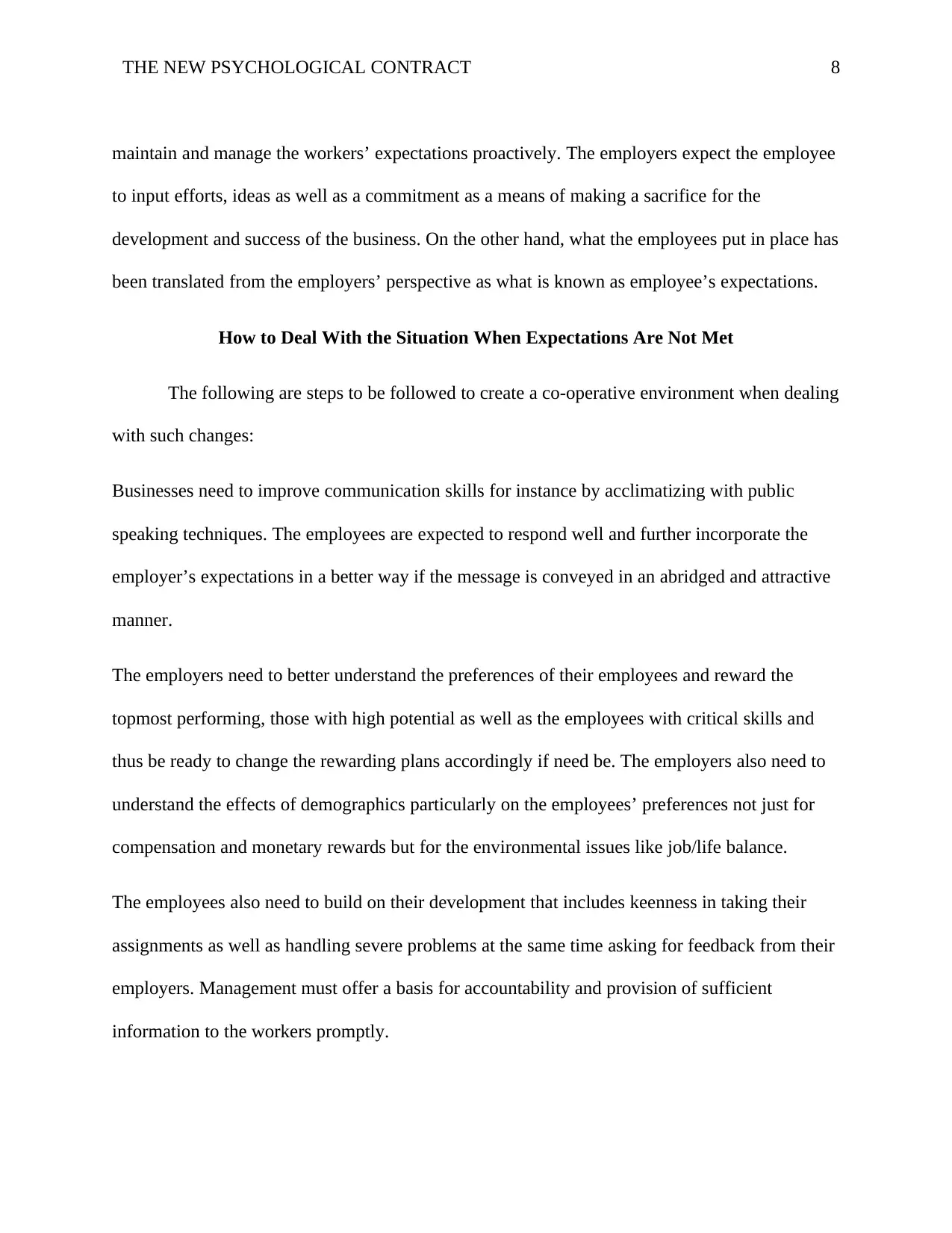
THE NEW PSYCHOLOGICAL CONTRACT 8
maintain and manage the workers’ expectations proactively. The employers expect the employee
to input efforts, ideas as well as a commitment as a means of making a sacrifice for the
development and success of the business. On the other hand, what the employees put in place has
been translated from the employers’ perspective as what is known as employee’s expectations.
How to Deal With the Situation When Expectations Are Not Met
The following are steps to be followed to create a co-operative environment when dealing
with such changes:
Businesses need to improve communication skills for instance by acclimatizing with public
speaking techniques. The employees are expected to respond well and further incorporate the
employer’s expectations in a better way if the message is conveyed in an abridged and attractive
manner.
The employers need to better understand the preferences of their employees and reward the
topmost performing, those with high potential as well as the employees with critical skills and
thus be ready to change the rewarding plans accordingly if need be. The employers also need to
understand the effects of demographics particularly on the employees’ preferences not just for
compensation and monetary rewards but for the environmental issues like job/life balance.
The employees also need to build on their development that includes keenness in taking their
assignments as well as handling severe problems at the same time asking for feedback from their
employers. Management must offer a basis for accountability and provision of sufficient
information to the workers promptly.
maintain and manage the workers’ expectations proactively. The employers expect the employee
to input efforts, ideas as well as a commitment as a means of making a sacrifice for the
development and success of the business. On the other hand, what the employees put in place has
been translated from the employers’ perspective as what is known as employee’s expectations.
How to Deal With the Situation When Expectations Are Not Met
The following are steps to be followed to create a co-operative environment when dealing
with such changes:
Businesses need to improve communication skills for instance by acclimatizing with public
speaking techniques. The employees are expected to respond well and further incorporate the
employer’s expectations in a better way if the message is conveyed in an abridged and attractive
manner.
The employers need to better understand the preferences of their employees and reward the
topmost performing, those with high potential as well as the employees with critical skills and
thus be ready to change the rewarding plans accordingly if need be. The employers also need to
understand the effects of demographics particularly on the employees’ preferences not just for
compensation and monetary rewards but for the environmental issues like job/life balance.
The employees also need to build on their development that includes keenness in taking their
assignments as well as handling severe problems at the same time asking for feedback from their
employers. Management must offer a basis for accountability and provision of sufficient
information to the workers promptly.
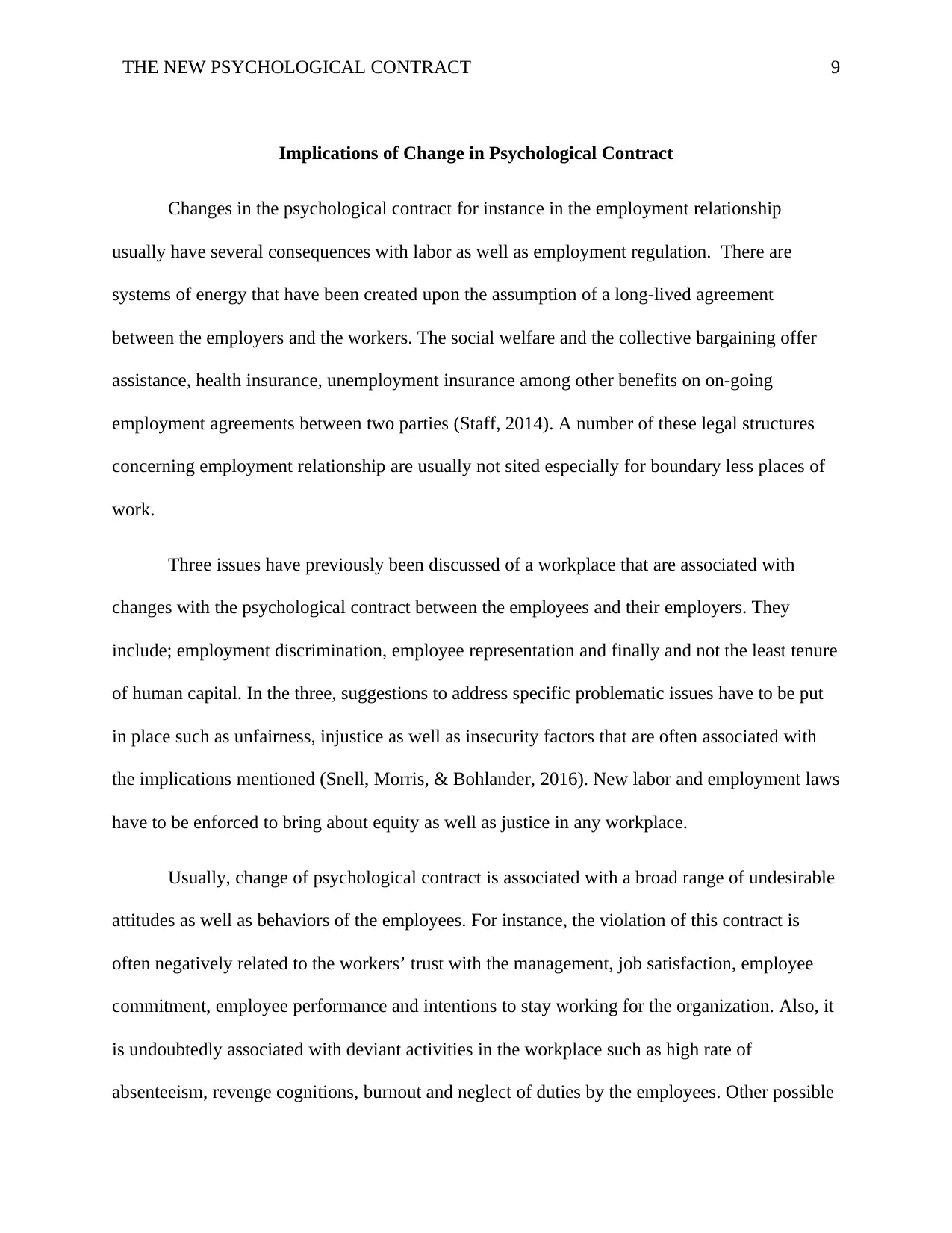
THE NEW PSYCHOLOGICAL CONTRACT 9
Implications of Change in Psychological Contract
Changes in the psychological contract for instance in the employment relationship
usually have several consequences with labor as well as employment regulation. There are
systems of energy that have been created upon the assumption of a long-lived agreement
between the employers and the workers. The social welfare and the collective bargaining offer
assistance, health insurance, unemployment insurance among other benefits on on-going
employment agreements between two parties (Staff, 2014). A number of these legal structures
concerning employment relationship are usually not sited especially for boundary less places of
work.
Three issues have previously been discussed of a workplace that are associated with
changes with the psychological contract between the employees and their employers. They
include; employment discrimination, employee representation and finally and not the least tenure
of human capital. In the three, suggestions to address specific problematic issues have to be put
in place such as unfairness, injustice as well as insecurity factors that are often associated with
the implications mentioned (Snell, Morris, & Bohlander, 2016). New labor and employment laws
have to be enforced to bring about equity as well as justice in any workplace.
Usually, change of psychological contract is associated with a broad range of undesirable
attitudes as well as behaviors of the employees. For instance, the violation of this contract is
often negatively related to the workers’ trust with the management, job satisfaction, employee
commitment, employee performance and intentions to stay working for the organization. Also, it
is undoubtedly associated with deviant activities in the workplace such as high rate of
absenteeism, revenge cognitions, burnout and neglect of duties by the employees. Other possible
Implications of Change in Psychological Contract
Changes in the psychological contract for instance in the employment relationship
usually have several consequences with labor as well as employment regulation. There are
systems of energy that have been created upon the assumption of a long-lived agreement
between the employers and the workers. The social welfare and the collective bargaining offer
assistance, health insurance, unemployment insurance among other benefits on on-going
employment agreements between two parties (Staff, 2014). A number of these legal structures
concerning employment relationship are usually not sited especially for boundary less places of
work.
Three issues have previously been discussed of a workplace that are associated with
changes with the psychological contract between the employees and their employers. They
include; employment discrimination, employee representation and finally and not the least tenure
of human capital. In the three, suggestions to address specific problematic issues have to be put
in place such as unfairness, injustice as well as insecurity factors that are often associated with
the implications mentioned (Snell, Morris, & Bohlander, 2016). New labor and employment laws
have to be enforced to bring about equity as well as justice in any workplace.
Usually, change of psychological contract is associated with a broad range of undesirable
attitudes as well as behaviors of the employees. For instance, the violation of this contract is
often negatively related to the workers’ trust with the management, job satisfaction, employee
commitment, employee performance and intentions to stay working for the organization. Also, it
is undoubtedly associated with deviant activities in the workplace such as high rate of
absenteeism, revenge cognitions, burnout and neglect of duties by the employees. Other possible
⊘ This is a preview!⊘
Do you want full access?
Subscribe today to unlock all pages.

Trusted by 1+ million students worldwide
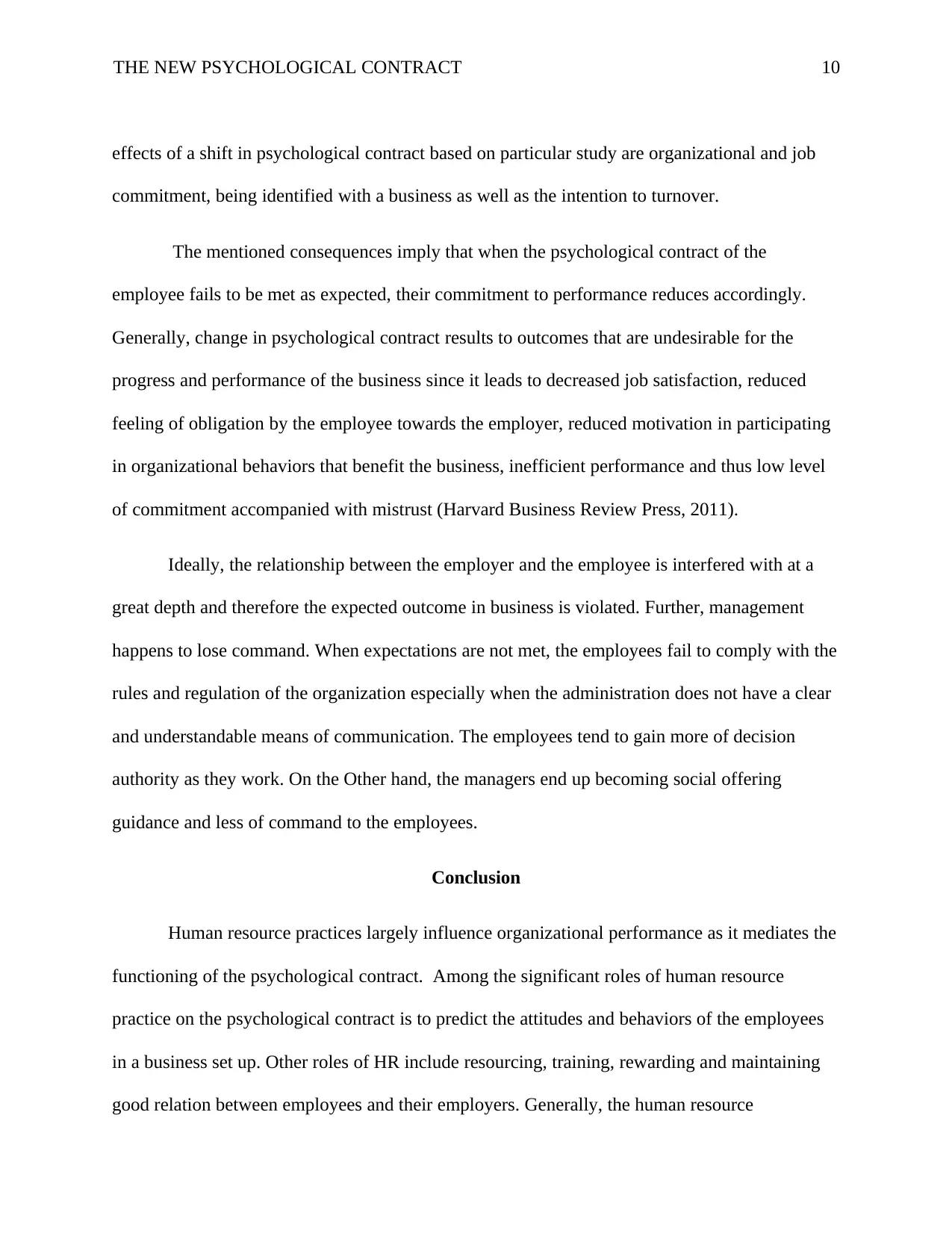
THE NEW PSYCHOLOGICAL CONTRACT 10
effects of a shift in psychological contract based on particular study are organizational and job
commitment, being identified with a business as well as the intention to turnover.
The mentioned consequences imply that when the psychological contract of the
employee fails to be met as expected, their commitment to performance reduces accordingly.
Generally, change in psychological contract results to outcomes that are undesirable for the
progress and performance of the business since it leads to decreased job satisfaction, reduced
feeling of obligation by the employee towards the employer, reduced motivation in participating
in organizational behaviors that benefit the business, inefficient performance and thus low level
of commitment accompanied with mistrust (Harvard Business Review Press, 2011).
Ideally, the relationship between the employer and the employee is interfered with at a
great depth and therefore the expected outcome in business is violated. Further, management
happens to lose command. When expectations are not met, the employees fail to comply with the
rules and regulation of the organization especially when the administration does not have a clear
and understandable means of communication. The employees tend to gain more of decision
authority as they work. On the Other hand, the managers end up becoming social offering
guidance and less of command to the employees.
Conclusion
Human resource practices largely influence organizational performance as it mediates the
functioning of the psychological contract. Among the significant roles of human resource
practice on the psychological contract is to predict the attitudes and behaviors of the employees
in a business set up. Other roles of HR include resourcing, training, rewarding and maintaining
good relation between employees and their employers. Generally, the human resource
effects of a shift in psychological contract based on particular study are organizational and job
commitment, being identified with a business as well as the intention to turnover.
The mentioned consequences imply that when the psychological contract of the
employee fails to be met as expected, their commitment to performance reduces accordingly.
Generally, change in psychological contract results to outcomes that are undesirable for the
progress and performance of the business since it leads to decreased job satisfaction, reduced
feeling of obligation by the employee towards the employer, reduced motivation in participating
in organizational behaviors that benefit the business, inefficient performance and thus low level
of commitment accompanied with mistrust (Harvard Business Review Press, 2011).
Ideally, the relationship between the employer and the employee is interfered with at a
great depth and therefore the expected outcome in business is violated. Further, management
happens to lose command. When expectations are not met, the employees fail to comply with the
rules and regulation of the organization especially when the administration does not have a clear
and understandable means of communication. The employees tend to gain more of decision
authority as they work. On the Other hand, the managers end up becoming social offering
guidance and less of command to the employees.
Conclusion
Human resource practices largely influence organizational performance as it mediates the
functioning of the psychological contract. Among the significant roles of human resource
practice on the psychological contract is to predict the attitudes and behaviors of the employees
in a business set up. Other roles of HR include resourcing, training, rewarding and maintaining
good relation between employees and their employers. Generally, the human resource
Paraphrase This Document
Need a fresh take? Get an instant paraphrase of this document with our AI Paraphraser
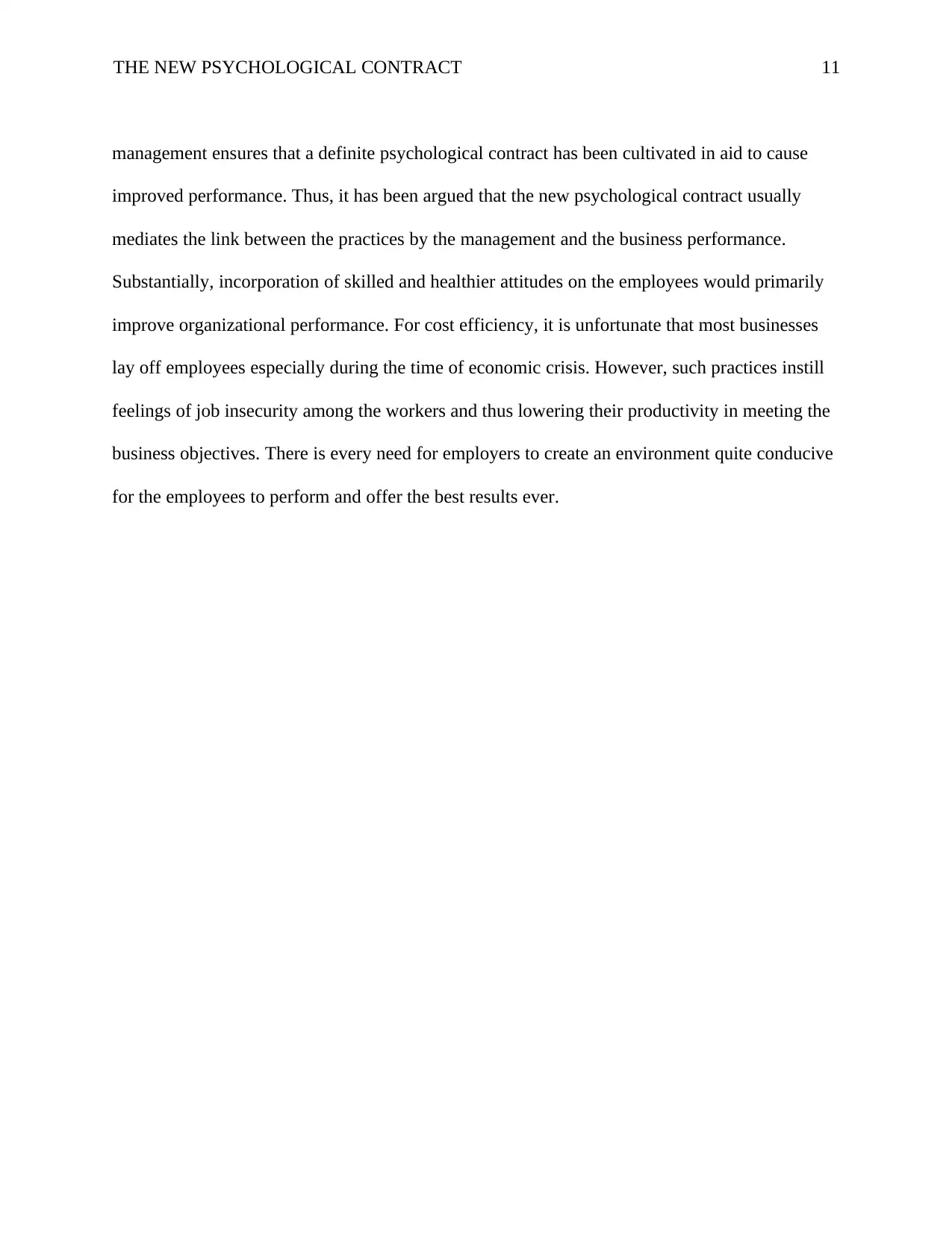
THE NEW PSYCHOLOGICAL CONTRACT 11
management ensures that a definite psychological contract has been cultivated in aid to cause
improved performance. Thus, it has been argued that the new psychological contract usually
mediates the link between the practices by the management and the business performance.
Substantially, incorporation of skilled and healthier attitudes on the employees would primarily
improve organizational performance. For cost efficiency, it is unfortunate that most businesses
lay off employees especially during the time of economic crisis. However, such practices instill
feelings of job insecurity among the workers and thus lowering their productivity in meeting the
business objectives. There is every need for employers to create an environment quite conducive
for the employees to perform and offer the best results ever.
management ensures that a definite psychological contract has been cultivated in aid to cause
improved performance. Thus, it has been argued that the new psychological contract usually
mediates the link between the practices by the management and the business performance.
Substantially, incorporation of skilled and healthier attitudes on the employees would primarily
improve organizational performance. For cost efficiency, it is unfortunate that most businesses
lay off employees especially during the time of economic crisis. However, such practices instill
feelings of job insecurity among the workers and thus lowering their productivity in meeting the
business objectives. There is every need for employers to create an environment quite conducive
for the employees to perform and offer the best results ever.
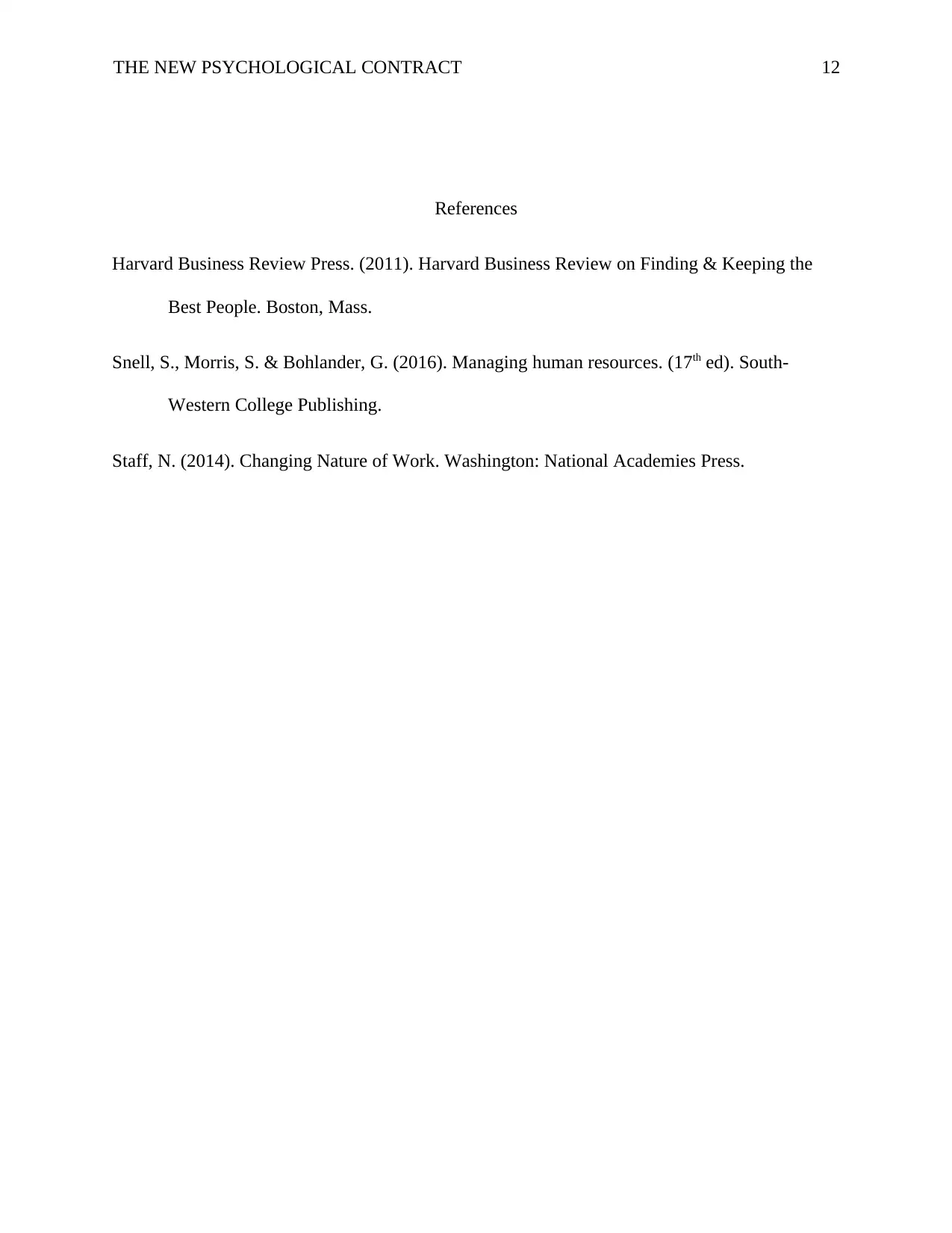
THE NEW PSYCHOLOGICAL CONTRACT 12
References
Harvard Business Review Press. (2011). Harvard Business Review on Finding & Keeping the
Best People. Boston, Mass.
Snell, S., Morris, S. & Bohlander, G. (2016). Managing human resources. (17th ed). South-
Western College Publishing.
Staff, N. (2014). Changing Nature of Work. Washington: National Academies Press.
References
Harvard Business Review Press. (2011). Harvard Business Review on Finding & Keeping the
Best People. Boston, Mass.
Snell, S., Morris, S. & Bohlander, G. (2016). Managing human resources. (17th ed). South-
Western College Publishing.
Staff, N. (2014). Changing Nature of Work. Washington: National Academies Press.
⊘ This is a preview!⊘
Do you want full access?
Subscribe today to unlock all pages.

Trusted by 1+ million students worldwide
1 out of 12
Related Documents
Your All-in-One AI-Powered Toolkit for Academic Success.
+13062052269
info@desklib.com
Available 24*7 on WhatsApp / Email
![[object Object]](/_next/static/media/star-bottom.7253800d.svg)
Unlock your academic potential
Copyright © 2020–2026 A2Z Services. All Rights Reserved. Developed and managed by ZUCOL.





